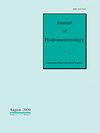West-WRF 34-Year Reforecast: Description and Validation
IF 2.9
3区 地球科学
Q2 METEOROLOGY & ATMOSPHERIC SCIENCES
引用次数: 1
Abstract
This study presents a high-resolution regional reforecast based on the Weather Research and Forecasting (WRF) model, tailored for the prediction of extreme hydrometeorological events over the Western U.S. (West-WRF) spanning 34 cool seasons (1 December to 31 March) from 1986 to 2019. The West-WRF reforecast has a 9-km domain covering Western North America and the Eastern Pacific Ocean and a 3-km domain covering much of California. The West-WRF reforecast is generated by dynamically downscaling the control member of the Global Ensemble Forecasting System (GEFS) v10 reforecast. Verification of near-surface temperature, wind, and humidity highlight the added value in the reforecast compared to GEFS. Analysis of geopotential height indicates that West-WRF reduces the bias throughout much of the troposphere during early lead times. The West-WRF reforecast also shows clear improvement in atmospheric river characteristics (intensity and landfall) over GEFS. Analysis of mean areal precipitation (MAP) shows that at the basin-scale, the reforecast can improve MAP compared to GEFS and reveals a consistent low bias in the reforecast for a coastal watershed (Russian) and a high bias observed in a Northern Sierra watershed (Yuba). The reforecast has a dry bias in seasonal precipitation in the northern Central Valley and Coastal Mountain ranges, and a wet bias in the Northern Sierra Nevada, consistent with other operational high resolution (< 25 km) regional models. The applications of this high-resolution multi-year reforecast include process-based studies, assessment of model performance, and machine learning applications.西wrf 34年再预报:描述与验证
本研究提出了一个基于天气研究与预报(WRF)模式的高分辨率区域再预报,该模式为1986年至2019年美国西部(West-WRF) 34个凉爽季节(12月1日至3月31日)的极端水文气象事件预测量身定制。西wrf重预报的9公里范围覆盖北美西部和东太平洋,3公里范围覆盖加州大部分地区。西wrf重预报是由全球综合预报系统(GEFS) v10重预报的控制分量动态降尺度产生的。与GEFS相比,近地表温度、风和湿度的验证突出了重预报的附加价值。对位势高度的分析表明,在提前期,西wrf减少了对流层大部分地区的偏置。西wrf重预报也显示了在GEFS上大气河流特征(强度和登陆)的明显改善。对平均面降水量(MAP)的分析表明,在流域尺度上,与GEFS相比,重预报可以改善MAP,并且在沿海流域(俄罗斯)的重预报中显示出一致的低偏差,而在北部塞拉流域(尤巴)的重预报中观测到高偏差。重新预报的季节降水在中央谷地北部和沿海山脉偏干,内华达山脉北部偏湿,与其他高分辨率(< 25公里)区域模式一致。这种高分辨率多年再预测的应用包括基于过程的研究、模型性能评估和机器学习应用。
本文章由计算机程序翻译,如有差异,请以英文原文为准。
求助全文
约1分钟内获得全文
求助全文
来源期刊

Journal of Hydrometeorology
地学-气象与大气科学
CiteScore
7.40
自引率
5.30%
发文量
116
审稿时长
4-8 weeks
期刊介绍:
The Journal of Hydrometeorology (JHM) (ISSN: 1525-755X; eISSN: 1525-7541) publishes research on modeling, observing, and forecasting processes related to fluxes and storage of water and energy, including interactions with the boundary layer and lower atmosphere, and processes related to precipitation, radiation, and other meteorological inputs.
 求助内容:
求助内容: 应助结果提醒方式:
应助结果提醒方式:


